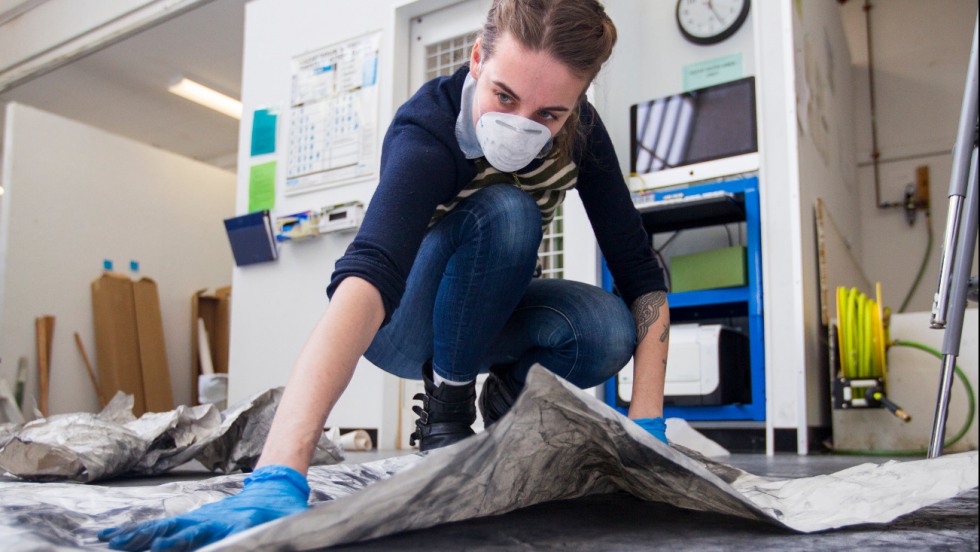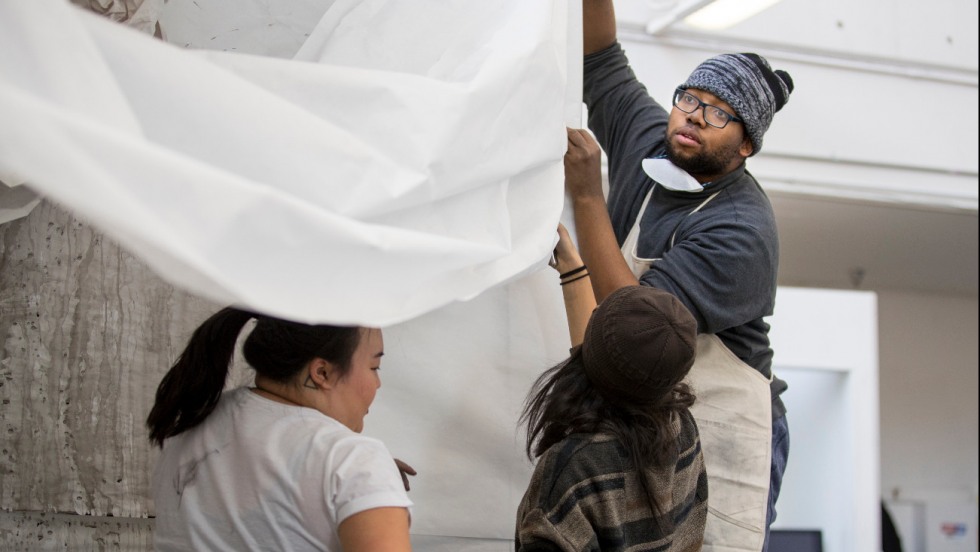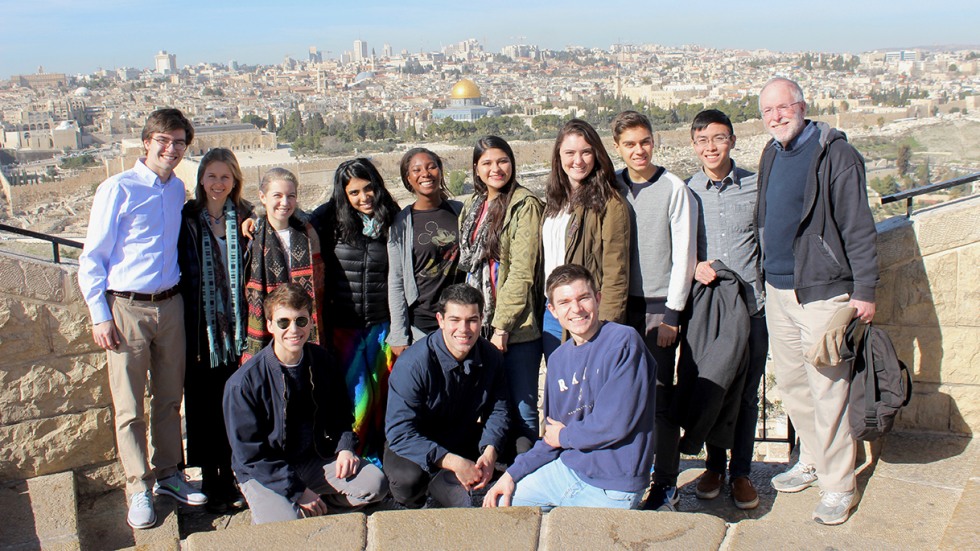PROVIDENCE, R.I. [Brown University] — On a cold early-January day, the Brown campus was mostly quiet and empty. The majority of students wouldn’t return to campus from winter break for two more weeks. But on the fourth floor of the Granoff Center, a dozen students were in the midst of a lively discussion of “Hairspray.” What started with each person giving a simple thumbs-up or thumbs-down review of the well-known musical quickly evolved into a spirited, in-depth conversation on representations of race, class and gender in musical theater. As the discussion ended with a close viewing of the final scene from “Hairspray,” there was a lot of candid talk, a lot of laughter — plus, Professor Guterl had brought donuts. “Really good ones,” one student said.
The class, “Broadway Modern: Race, Sex and Class in the Modern American Musical,” taught by American studies professor Matthew Guterl, was one of 10 offered this year in Brown’s first Wintersession, a three-week mini-term sandwiched between the fall and spring semesters and designed to give students a unique compressed learning experience. Students could take one class during the session, which ends on January 23, for which they will receive credit equivalent to a regular semester-long course. In this first year, six classes were taught entirely on campus; three destination courses included travel to Israel-Palestine, Thailand and Hawaii; and one online course had students participating remotely. Courses spanned the disciplines, ranging from the visual arts to engineering to history.
“Wintersession offers students the opportunity for more intensive engagement in subject matter,” said Besenia Rodriguez, senior associate dean for curriculum, who oversees the program. “Whether it’s an entrepreneurial initiative that they are working on or a visual arts project — whatever they are doing, they can focus on just that one topic without the many distractions that Brown students have during the normal school year.”
Like the majority of Wintersession classes, “Broadway Modern” was designed specifically to fit within the term’s short format, Guterl said. The class, which asked students to survey, critique and theorize what the musical genre says about the interplay of race, sex and class in contemporary American culture, culminated in a trip to see “Hamilton” on Broadway. By the time they watched it in person, students were expected not only to be completely familiar with the soundtrack (karaoke on the bus to New York City, he said, was a definite possibility) but also fully equipped with a semester’s worth of theoretical background to critically interrogate, in real time, the issues of identity that proliferate the renowned musical.
“There is a lot of value in the long, intimate conversations you can have when students have no other classes on their schedule and when they are working closely together on a common set of questions in a narrow window of time,” Guterl said. “After just a few sessions, we were on a first-name basis around the room; we all got each other’s jokes. The class really loosened up. That made our work intellectual work together easier.”
Kath Kryuchkova jumped at the chance to take Guterl’s class. A senior from Russia concentrating in applied math and philosophy, Kryuchkova said the class, far removed from the focus of her concentration, offered her a chance to fill in a cultural blank. “The musical is a very American genre, and I kept encountering it in conversation or pop culture and realizing I knew very little about it,” she said. “To have a survey course like this has helped me to better understand American culture and modern culture at large. Not to mention that I am now totally obsessed with ‘Hamilton.’”
Plus, Kryuchkova said, the winter break usually feels too long. “The transition back to spring semester is always a bit rough; I kind of lose my rhythm,” she said. “Wintersession was a good opportunity to take a really fun class and concentrate on one thing but also to ease the transition into the next semester.”
Aimee Vue, a senior and visual arts concentrator who took a Wintersession class called “Monumental Drawing” — a studio arts course that gave both experienced and novice artists a chance to explore experimental approaches to drawing — was also interested in getting back to campus earlier. “I wanted to have more time at school and have a really immersive experience,” she said. “During the semester, I usually have a lot of other classes that I have to worry about, and I was really excited to be able to really focus on just drawing.”
Vue said she spent upwards of 30 hours a week doing work for the class. Each student in “Monumental Drawing” was assigned a solo studio, something normally only given to painting students during the regular school year. Lisa Perez, who taught the course, said that having this kind of focused time in one’s own studio is a rare and important opportunity.
“To have the dedicated studio time makes the Wintersession that much more rich,” she said. “Because students don’t have to take their work down each day and put it away, it gives them a space to develop ideas on their own and get really into it.”
Wintersession also offers faculty a chance to explore new approaches to teaching familiar material. Over the past decade, Professor of Judaic Studies David Jacobson has taught various precursors to and incarnations of his destination Wintersession course, “The Israeli-Palestinian Conflict: Contested Narratives.” The Wintersession class began on campus with students reading, viewing and discussing historical documents, memoirs, works of fiction and films that present the story of the conflict from both perspectives. The second part of the class took students on a week-long trip to Israel-Palestine, where they spent time with Israelis and Palestinians who are working together in a variety of capacities to attain mutual understanding and end the conflict.
Though Jacobson took students to Israel last year during spring break as part of his regular semester-long course in 2015, the shortened timeframe of Wintersession changed the learning dynamic, he said. “Everything they’ve read is fresh in their minds. So they go to Israel with the strength of having recently studied all this material and then being able to immediately apply it,” he said. “The trip to Israel-Palestine really is the climax of the Wintersession course.”
The kind of singular, immersive experience represented by “Broadway Modern,” “Monumental Drawing” and “Contested Narratives” is precisely what Brown’s Committee on Educational Innovation had in mind when they put forth Wintersession as a recommendation in 2015, says Rodriguez. When a task force was subsequently formed to envision what Wintersession would look like, the group stressed the additional goal of making the mini-term affordable and accessible.
In order to achieve this, students who receive financial aid during the school year received comparable aid for Wintersession, and students were not charged extra housing fees during the session to stay in their usual on-campus housing. The destination courses were recipients of the University’s Global Experiential Learning and Teaching grants, which covered the cost of travel, making the tuition equal to that of on-campus and online courses. Additionally, most classes did not have a prerequisite, and none targeted a particular class year. This year, approximately 130 students participated in Wintersession, and more than percent of those received financial aid. Many of the courses had waiting lists.
As the three-year Wintersession pilot progresses, Rodriguez says that the program will be tweaked based on interest and feedback from students and faculty. Additional online courses might be added, for instance, and housing needs will continue to be evaluated.
“In part, this first year has been an experiment to see if there is interest on the part of the students,” Rodriguez said. “Is this how they want to learn at Brown? Is this how they want to spend time between semesters? In the future, we will continue to have an eye toward creating unique experiences that students won’t get in the regular academic year and ensuring that Wintersession is an opportunity that is accessible to as many Brown students as possible.”


